- Home
- Rachel Ford
An End in Ice Page 4
An End in Ice Read online
Page 4
I have mentioned already that I waited for the morning sun that evening, but when I awoke to its rays I found, with some sadness, that it had no effect on me. The full weight of my situation now truly took hold of me. I was a damned creature, a Monster, a Thing that fed on the blood of others. Warmth was lost to me, except in that instant of unholy feeding, when I would sup on another's lifesource. Worse, as I would find out by accident was that I could not feed without doing harm. Once I parted a creature's veins, my venom was a part of it; if I killed the creature, its life was on my hands; if I did not, it would turn, either at the end of its natural life or when some other creature killed it, into the same foul beast that I had become.
This, as I say, I discovered rather by accident. It was a few days after my initial feeding. I had long since abandoned my plan of going to Rusloc to seek out sustenance. Knowing, now, my true nature, I wandered rather aimlessly about. I could not bring myself to feed again, and, as I have already alluded to earlier, that was hard to do at any rate, for wildlife naturally avoided my kind, as if they could sense, and feared, the Undead more even than humans. So it was that I traveled for long stretches of time without happening upon any creatures of the forest.
Those rare creatures that were about, whether out of desperation for food or some other concern, shunned me whenever I neared. This gesture, so eerily reminiscent of my family and friends that had betrayed me, enraged my heart, until, once, at the sight of a squirrel hastening away from me, I flew into such a temper that I pursued the poor creature. Up tree and down it ran, over rocks and under bushes; and my fury flared with every maneuver. It seemed, to me, in that stupor of anger, that the creature had not only slighted me, but now made a mockery of me, outwitting me by turns. My newfound skills, my perfected hearing and sharpness of sight, helped me to keep track of him, though he could out climb and outmaneuver me, and his fear of me drove him out of whatever hiding spots he might have found refuge in, in order to put greater distance between us. At length, I think my persistence must have exhausted him, for I caught him finally.
I do not make excuses for my behavior, but it is true that my reason, at this point, was tenuous at best; and when I had him, I heard the familiar cry of his blood, for I was both excessively hungry and angry. So I sank my teeth into him.
But then I pulled away – my hunger was not so great as it was when I happened upon the deer some nights past, and my shame at making war on a squirrel finally caught up to me. So I released the poor creature in a moment, setting him on a snow-covered rock. He trembled furiously, and a trickle of red ran from his throat. I felt a miserable combination of butcher and fool as I watched him, so as soon as he took to scurrying away, I too rose. But this movement on my part proved too much for the frightened rodent, and I heard him squeak in fear, and then fall softly.
I turned, and stared uncomprehendingly at his still form. He had been alive only a moment ago; of that I was sure. Now he was unmoving. I lifted him, trying to provoke some movement, half sure that it was a trick to convince me to leave. But he hung limp from my hand.
I was powerfully affected by the sight of that body, as the stag, and the unfortunate connection to my brother's killer that it conjured in my mind, could never have affected me. I wept, not with thoughts of myself, as I had cried before, but with pity for the thing I had killed.
Often had I hunted, and for sport as well as food; so the reaction was hardly sensible. I think it was the horror of it that prompted my tears this time, the horror that I had literally frightened a creature to death. So, perhaps, in a way, they were tears for myself after all.
But I wept, and raved, for some time, until I was exhausted. Then I slept, a dead, dreamless sleep. I was awakened some time later, not by the coming of day but by noise. It was a shrill sound, frantic and animalistic in nature, and so unlike anything that I had ever heard before that I was at once fully awake.
My glance at first revealed nothing, and this was alarming to me. The body, my latest victim's corpse, was gone. Had a bird of prey, or some scavenger, come by in the midst of night? Surely my ears would have detected it...
But no. The sounds, the squeaking, drew my eyes to its source, and the mystery of the vanished corpse was at once solved. The squirrel had risen – not as he had died. No, though dried blood crusted his fur, the hole in his throat was gone, as if it had never been there. And his eyes...they glowed a reddish color, even as he contorted wildly.
It was a sight more bizarre than words can intimate. The creature gyrated and twisted, and threw himself in all directions. His eye color vacillated with each movement, from its natural hue to a hellish red. I saw with an unusual swiftness – unusual, at least, for me – what was happening. The creature was changing, becoming a monster like myself; and yet, unlike me, his body resisted, intensely. The struggle I witnessed was evidence to that. His screeches were evidence of that.
Horror held me fast, transfixed, for a moment; and then duty compelled me to act. I would have to put the creature out of his misery. I knew it. So, ready for a chase like the last one, I advanced.
But he did not attempt to get away. He was rolling about madly, his bushy fur covered in snow, when I came upon him, and I took his head with one hand and his body with the other. In an instant, the act was done, and confirmed by a snapping sound that silenced both his cries and his wild gesticulations.
I dropped him then, trembling with this newfound knowledge that I had done to this creature exactly as the Monster had done to me.
But this incident was not exactly as my changing, my mind contradicted. I had not had such a struggle in changing. I had not been torn by such a violent transition. I had not even known that it had happened. The idea, and the suspicion that crept into my mind, made me tremble the more.
Was it possible that this creature, this little squirrel, was a purer creature than I, a better being? Was it possible that his heart was nobler than mine, thus his struggle greater? Whereas I succumbed without a fight, he resisted mightily? It is a question that I ponder to this day, and one to which I have added an alternative query: might it not have something to do with the fact that I had already taken life, that it was in my nature as a human being to do so, and that it was a thing opposed to the nature of a squirrel? It is a happier thought, and I hope it may be the right one.
But at the time, it was not in my mind; at the time, all the condemnations of the Vampire that I had ever heard came back to my thoughts with renewed fury, crashing upon my already fractured mind. Demon. Hellspawn. Damned. I had said the words before, but I had not accepted them; not upon myself. It was one thing to consider my brother's killer such, but another to apply the same terms to me. But it seemed to me, then, that they were appropriate.
I was distracted from these thoughts, however, by a sudden flurry of movement at my feet. A bushy tail and a wisp of red raced past me, and I realized with a sense of mortification that my work had not been successful. I may have snapped my unwilling protégée's neck, but he was not dead.
This time, the squirrel gave me the contest I first thought he might. He ran now faster than ever before, and did not tire so easily. It was only after some time, and with much luck, that I was able to catch him. He scratched and bit furiously, and though the wounds he inflicted were painful, they healed quickly. I did not have time to wonder at these miraculous recoveries, however: I was intent on finding a way to silence this creature I had made once and for all.
I had no time or means to start a fire – not without losing the beast, and risking setting loose a vampiric squirrel. It seemed a ridiculous idea, and even as I searched my brain for some alternative means of ending the thing's life, I laughed.
I remembered a custom, that I had heard applied to such monsters, of driving a shaft of iron through the heart. I had no iron on my person. I was, however, surrounded by trees, and so, hoping that wood would do as well, I plucked a branch from a nearby bough. This, still laughing – and rather hysterically, I confess – I drove th
rough the creature.
This time, his body wilted. The change was apparent at once. Any luster of life that he had was gone, and he looked an animal dead and in the elements some time. Still, I laughed.
As I mentioned before, my grasp on reason was tenuous at best during this period. Creating, by sheer accident, a demon squirrel as a sort of hellish son, and then having to stake the sorry creature, pushed me off the precipice I had been dangling over for some time. I laughed until the forest echoed with my mad, wailing bellows, and still I shook with laughter.
When, at length, the fit passed, I left the area, and went deeper into the woods. Somehow, whether by conscious design or sheer accident I cannot say, I made for the mountains. It was a good place for a creature such as I had become – remote, desolate, and with little potential for me to cause havoc.
And so it proved to be. There were few people in the higher reaches, and it is there that I went. When, by chance, I stumbled across some vestige of humanity in those lonely peaks, I shied away as if avoiding a plague bearer. I was an outcast, in the minds of those who knew me as well as my own. I hunted for my blood, and got quite good at avoiding detection by the wildlife. I preyed on deer, as I have said, primarily, but birds, bears, and wolves all fell to my appetite as well. Sometimes, when I was desperate for a meal, I would prey on the lesser creatures – rabbits, chipmunks, etc. But I always avoided the squirrels. Even in madness – or, perhaps, particularly in madness – I had an aversion to the things.
I became, I think, quite feral, a sort of untamed man, or man-like beast, as I roamed the wilds in those days. I was not savage in my methods – I caused no more pain that could be helped, even finding in time that I could kill before feeding with no adverse affects. But almost all traces of civilized life had gone from me. I wore my clothes until they turned to rags, and when they offered no more protection and fell from me I draped myself in animals skins. My hair grew long, and my beard wild. I did not wash, except in the heat of summer, and even then – with the mountain streams being as cold as they were – only rarely. I lost track of the days as they turned into months and then years. In time, I lost track even of the years.
And as I settled deeper into this state, I became more loathsome to people than people were to me – it was they who, catching a chance sighting, would recoil in alarm, rather than I. Legends, I would find later, sprang up about the mad hermit who inhabited the mountain tops; some said that I was a saint, a pious man devoted to God; and others that I was a devil. But I bothered no one, and no one bothered me.
In time, the madness waned. I had come to understand my abilities, to tolerate the taste of blood – for which I have never developed a fondness – and, eventually, to think of civilization again. I missed my family. I missed the comforts of life – even a roaring fire in a hearth, which no longer held warmth for me. But I thought fondly of the time I had passed in the village of my birth, and I yearned to see it again. I knew that many years had passed, and in this I hoped that I mind find forgiveness. My father might, perhaps, pardon me, if he knew that I had never turned my terrible curse against man.
Even if it was not the case, I thought that years would have dulled their memories of me. I would return to Vale, and know what I could know of them.
Though I had lived long years in wild solitude, I knew well enough that my feral appearance would prove injurious to any hope I had of regaining my old life. So I made up my mind that I should search out some means of cutting my hair and trimming my beard. And, of course, I would need clothes. These I would have to steal, and probably the scissors I would need for the rest of the job as well. I had no coin or goods to barter, and a frightening appearance that would dissuade anyone from dealing with me. Trade was not option. Theft it would have to be.
So, with this plan, if plan it may properly be called, in mind, I ventured down the mountainside. It was easy enough to get the tools I needed without detection, for there were a few houses and a monastery within a few days' journey. At least, it was so short a journey for me, though I think it should have taken a man some time longer.
The first house I searched had nothing of use, for it had long lain abandoned. I found the remnants of an old larder, empty but for a few dirt and mold covered clay plates. In the best of times, this would have been no use to me, for human food was abhorrent in my new form. But age and decay had rendered it useless to anyone, except perhaps an enterprising rodent. There remained precious few personal artifacts, and though I did find one set of clothes, this was as badly damaged by weather and decay as the remnants of food. It tore at my touch, and the smell besides turned my stomach.
The second home proved more useful. Here, I was able to locate a set of clothes, rather plain and designed for a leaner fellow than me, but not reeking of mildew, and sturdy in construction. They would more than do. There was a crude knife as well, and with this I managed the painful business of cutting through the mass of hair that had accumulated on my face and head. When I had trimmed as near my face as I dared, I moved on.
At length I came to the monastery, and this gave me pause. I had spent some time – years, though the count I could not rightly give – living as a beast. I hesitated, therefore, to tread on holy ground. I suppose I half feared that I might explode into a pillar of flame if I dared such an affront. But, at length, dare it I did, for I had not been so long out of civilization as to suppose my appearance was anything but wild. A chance reflection in the stream convinced me that I should be driven out of civilized society if I dared to step foot in it, looking as I did.
So I dared instead to enter the monastery. And no pillar ensued. In truth, it was an eventless bit of theft, for I entered as a light mist covering the ground, took what I needed, and stole away as the same.
After a necessary but most uncomfortable autumn scrubbing, and a good deal of work disentangling what little of my hair remained, I donned my pilfered clothes and made for my home. I was a thief and a monster, but at least I looked human enough.
CHAPTER FIVE
I arrived late in the afternoon some days later. An idea, vague as it was, had been growing in my mind, that I should take my place among humanity. If I could know my parents' minds, and know if I would be forgiven, I might take up residence in my village; and, if not, I should go elsewhere, for I had seen the world, or so it seemed, from atop my mountain, and it was wide and vast and full of spaces in which even one such as I might make a home.
It was dusk, but I could see with little difficulty in the sparse gray light. It was a strange feeling, to see men upon the road, or the little, muddy enterprise that was meant to pass as one, where once I, as a man and growing boy, had trod. It was a perfectly normal, mundane behavior, to follow a path to get where you meant to go; and yet it was one that I, in my animal-like state, had done so little of in the past years that it affected me powerfully. I was back among the living, behaving as a civilized man might do. No longer was I the frightened or mad beast I had been. I was a son of Vale, and I was come home to live as one.
It seemed to me as if nothing had changed. There was my house – my family's home – standing as I remembered it, a little worse for the years but otherwise unchanged. It was not, nor had it ever been, more than a humble dwelling for humble folk, but it was a thing of such immense beauty to me, then, that I felt my eyes moisten at the sight of it. But it was late, and though I had rehearsed the words many times, I felt my courage wane and my tongue tie at the thought of what I might say to my father...to my mother.
And so instead I went to the church. As a traveler and a stranger, as was the fiction upon which I settled until such time as I knew where I stood, it was natural that I would go there first. The good father would always set aside a full bowl and a warm bed for travelers, and though the former was of little interest to me, the latter was appealing. It had been years, how many I could not say, since I had slept in a proper bed. I relished the idea. But that was a minor consideration compared to seeing Father Andrei again. He w
ould be an old man now, I supposed, and I wondered if he would recognize me. So far, I had attracted little more than a passing nod; these people, the friends of my childhood I supposed, had grown into men and women whom I did not recognize and who did not recognize me. I harbored a secret hope that the good father would remember me, for I had not forgotten his kindness, his faith in me when all the rest, save my mother, had doubted. He could, I knew as well, tell me something of my family, of my mother, to whose kindness alone I owed my life, of my sisters who must now all be grown women, probably married mothers; of the nieces and nephews I might now have; and of my father, and if he should welcome or revile me.
Here alone there seemed to be the greatest change in Vale, for the simple church had made way for a grander building off which ran a gated monastery. There hung by this gate a bell, which I rang. In a moment it was answered, by a round-faced brother whose thin frame seemed somehow at odds with the shape of his head. I conveyed that I was a traveler seeking shelter for the evening, and was admitted with the warmth I expected. “I hoped,” I ventured, “that I might see Father Andrei.”
“Father Andrei?” the monk, whose name was Brother Gregorius, repeated. “Ah! You must mean the Abbot?”
“Abbot?” This was news to me, of course, for when I had left, the good father was just that. “Forgive me, I have not seen him in some years. It is pleasing to hear of his ascendency, though.”
“Of course,” the novice nodded. “He has been our abbot for twenty years now. You must have been very young to know him before that.”
“One does not forget such a holy man, whatever one's age,” I demurred.
Brother Gregorius gave me a piercing, almost disapproving look, but seeing my expression it morphed into something like an uneasiness. “Yes. Well, certainly. At any rate, I shall see if the Abbot can receive you.” He hesitated. “He is, you know, very busy. What name shall I give?”

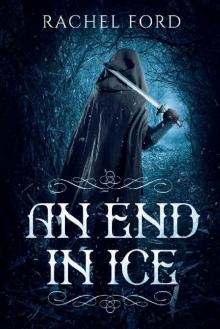 An End in Ice
An End in Ice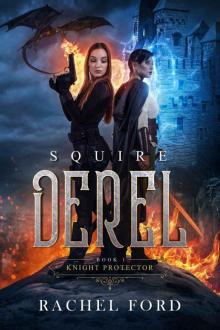 Squire Derel
Squire Derel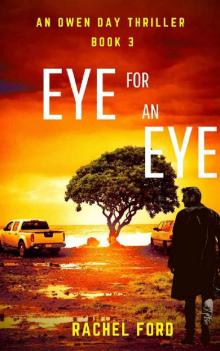 Eye for an Eye (An Owen Day Thriller)
Eye for an Eye (An Owen Day Thriller)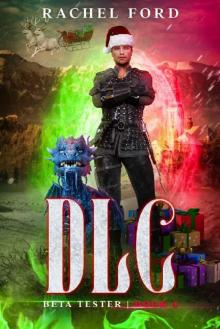 DLC: A LitRPG Adventure (Beta Tester Book 4)
DLC: A LitRPG Adventure (Beta Tester Book 4) Prison Break
Prison Break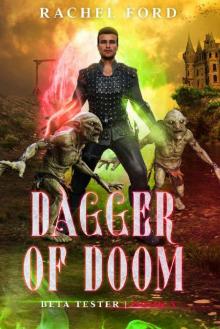 Dagger of Doom: A LitRPG Adventure (Beta Tester Book 5)
Dagger of Doom: A LitRPG Adventure (Beta Tester Book 5) Lee Shores
Lee Shores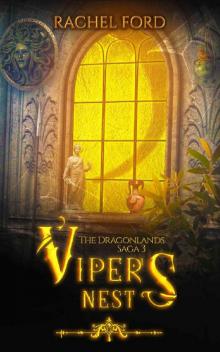 Viper's Nest
Viper's Nest Solar Flares & Tax Snares
Solar Flares & Tax Snares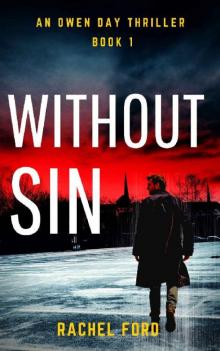 Without Sin (An Owen Day Thriller)
Without Sin (An Owen Day Thriller) UFOs & Unpaid Taxes
UFOs & Unpaid Taxes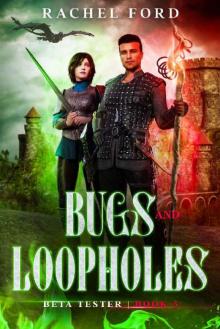 Bugs and Loopholes: A LitRPG Adventure (Beta Tester Book 3)
Bugs and Loopholes: A LitRPG Adventure (Beta Tester Book 3)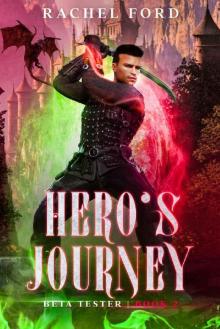 Hero's Journey: A LitRPG Adventure (Beta Tester Book 2)
Hero's Journey: A LitRPG Adventure (Beta Tester Book 2)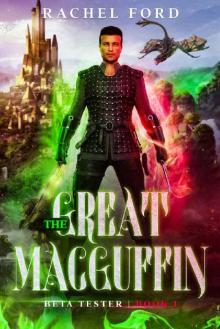 The Great MacGuffin: A LitRPG Adventure (Beta Tester Book 1)
The Great MacGuffin: A LitRPG Adventure (Beta Tester Book 1)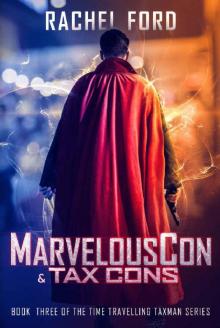 MarvelousCon & Tax Cons
MarvelousCon & Tax Cons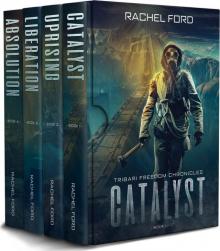 The Tribari Freedom Chronicles Boxset
The Tribari Freedom Chronicles Boxset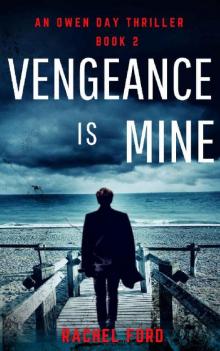 Vengeance Is Mine (An Owen Day Thriller)
Vengeance Is Mine (An Owen Day Thriller)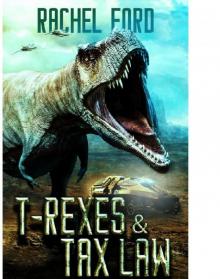 T-Rexes & Tax Law
T-Rexes & Tax Law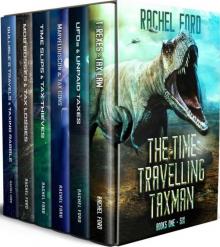 The Time Travelling Taxman Series Box Set
The Time Travelling Taxman Series Box Set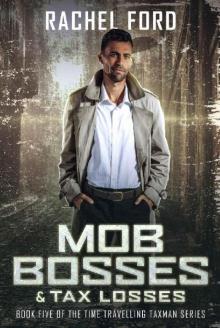 Mob Bosses & Tax Losses
Mob Bosses & Tax Losses